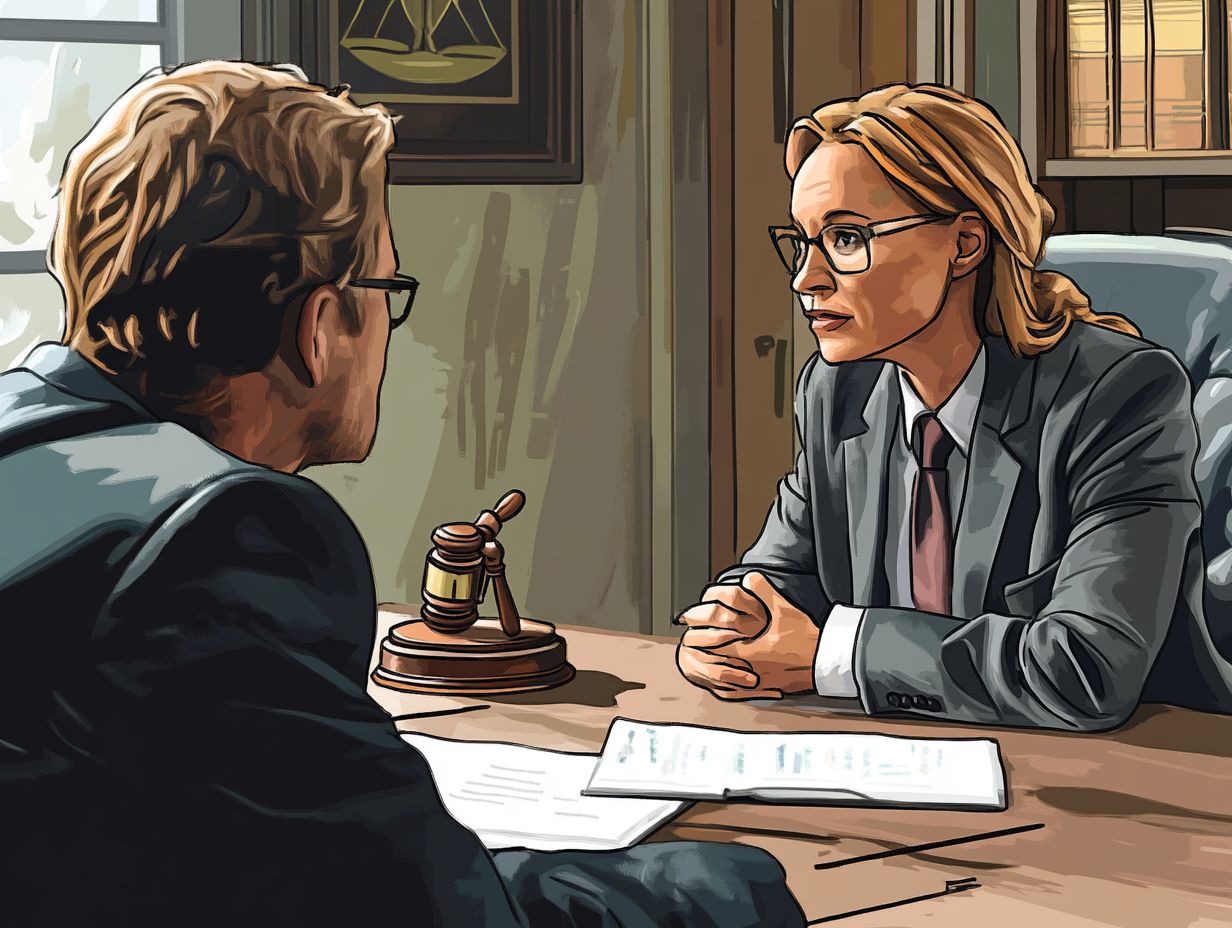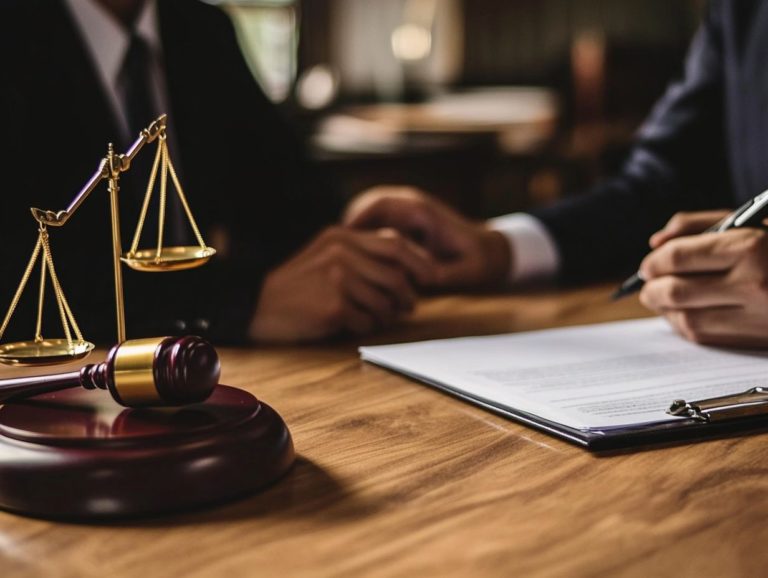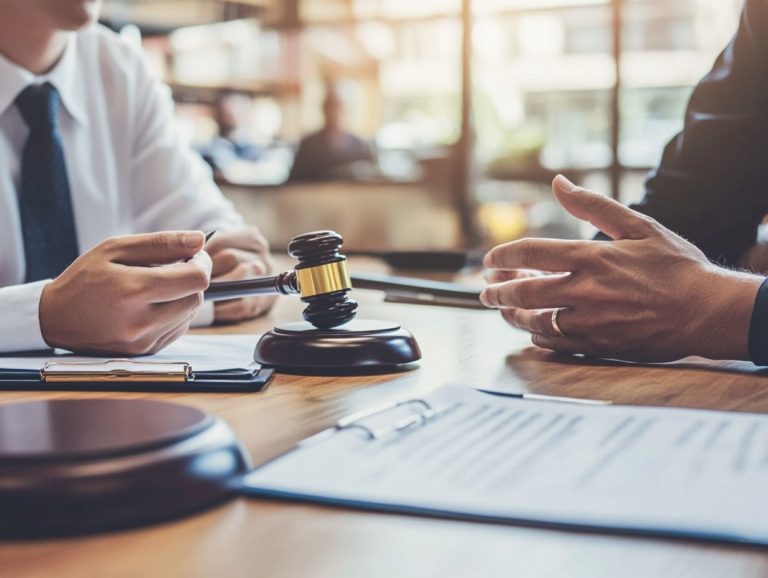5 Essential Questions for Your Defense Attorney
Selecting the right defense attorney is vital for effectively navigating the complexities of the legal system. With so much on the line, you need to grasp not only their qualifications but also their approach and communication style throughout your case.
This article presents five essential questions to pose to your defense attorney, encompassing aspects such as their experience, fees, potential outcomes, and your role as a client.
By arming yourself with this knowledge, you can make an informed decision and feel assured in your legal representation.
Contents
- Key Takeaways:
- 1. What Is Your Experience and Background in Criminal Defense?
- 2. What Is Your Approach to Handling Cases?
- 3. How Will You Communicate with Me Throughout the Legal Process?
- 4. How Do You Handle Conflicts of Interest?
- 5. What Are Your Fees and Payment Structure?
- What Are the Potential Outcomes of My Case?
- Frequently Asked Questions
- What five questions should I ask when hiring a defense attorney?
- How important is experience when choosing a defense attorney?
- What should I look for in terms of communication with my defense attorney?
- How can I gauge the attorney’s strategy for defending my case?
- Is cost the most important factor when choosing a defense attorney?
- Can I ask for references or testimonials from past clients?
Key Takeaways:

Choose a defense attorney with extensive experience and a strong background in criminal defense. Ask about the attorney’s approach to handling cases and how they will communicate with you throughout the legal process. Understand how the attorney handles conflicts of interest and their fees and payment structure.
1. What Is Your Experience and Background in Criminal Defense?
When you’re on the hunt for a criminal defense lawyer, understanding their experience and background is crucial. You want a trustworthy and competent attorney, someone like Janet Altschuler from Tucson, representing you in court.
A skilled criminal defense attorney should have extensive knowledge of both misdemeanors and felonies, along with a track record of successful case outcomes. Your future, rights, and potential penalties depend on having strong legal representation.
It s crucial to ask about their experience with cases similar to yours and what specific strategies they employ to defend against criminal charges.
An experienced attorney often brings a wealth of familiarity with local laws and court procedures, which can significantly sway case outcomes. For instance, attorneys who’ve navigated numerous trials may be acutely aware of particular judges’ preferences or prosecution trends.
They could have successfully defended clients against charges ranging from DUI to theft. They employ unique tactics like negotiating with the prosecution to reduce charges or penalties based on mitigating circumstances.
By collecting evidence from previous cases and leveraging past successes, an adept lawyer can craft a robust defense that resonates with the court. This smart approach strengthens your case and gives you confidence in the legal journey ahead.
2. What Is Your Approach to Handling Cases?
A well-defined approach to handling criminal cases is essential for ensuring effective representation and achieving favorable outcomes, especially when facing prosecution.
This is where the significance of a tailored defense strategy truly comes into focus. Each case presents its unique circumstances, and savvy attorneys understand that a general approach won t work.
They take the time to gather evidence carefully, sift through crucial documents, and conduct interviews with witnesses to uncover facts that could undermine the prosecution’s case.
By pinpointing vulnerabilities within the opposing side’s arguments, they can formulate a robust counterstrategy that may involve effective negotiation tactics designed to secure the best possible outcome for you.
Client consultations are pivotal in shaping this defense approach. They allow attorneys to grasp your specific concerns and objectives, ultimately guiding the direction of their strategy.
3. How Will You Communicate with Me Throughout the Legal Process?
Effective communication throughout your legal journey is essential for building trust and ensuring you remain informed and engaged in your case.
Your attorney will prioritize open channels of communication, providing regular updates and consultations tailored specifically to your needs. This might involve scheduling check-in calls or meetings to discuss case progress and address any concerns that arise.
Prompt responses to your questions are crucial; they reassure you that your needs are being prioritized. By allowing you to participate actively in decision-making, your attorney creates a collaborative environment that gives you the power to feel more in control of your legal path.
Staying consistently informed reduces anxiety and builds confidence in your attorney’s capabilities and strategies.
4. How Do You Handle Conflicts of Interest?

Handling conflicts of interest with transparency and integrity is key to maintaining your trust and ensuring effective legal representation.
Experienced professionals create clear protocols to identify potential conflicts early in the relationship. During initial consultations, they provide detailed disclosures about past relationships with other clients to give you complete clarity.
If a conflict does arise, attorneys might step away from the case or seek informed consent from everyone involved. Their commitment to ethical standards helps protect your rights, ensuring your best interests are always the priority.
5. What Are Your Fees and Payment Structure?
Understanding the fees and payment structure of your criminal defense attorney is essential for achieving financial transparency and avoiding unexpected charges. Knowing this can immediately increase your peace of mind during a stressful time.
You ll encounter various fee structures. For example, hourly rates charge you for the actual time spent on your case, while flat fees cover the entire defense for a specific charge.
Retainer agreements typically require an upfront payment, with funds being drawn down as your case progresses. Discussing these fees openly is vital to set clear expectations and build trust between you and your attorney, paving the way for a productive legal partnership.
What Are the Potential Outcomes of My Case?
The potential outcomes of your criminal case depend on several factors, including the nature of the charges, the evidence at play, and the effectiveness of your defense strategy.
As you navigate the complexities of a criminal trial, you may encounter various possible outcomes such as acquittals, plea deals, or convictions.
An acquittal often indicates that the prosecution has failed to meet its burden of proof, offering a sense of relief, though it may not entirely erase the stigma of the charges.
A plea deal may offer a pathway to reduced penalties, but it usually requires you to acknowledge guilt, which can have lasting effects on your future opportunities and personal reputation.
A conviction, especially in serious cases, could lead to significant imprisonment and long-lasting repercussions for your life.
The strength of the prosecution’s evidence is pivotal. Compelling evidence can sway a jury, while skilled defense tactics can highlight weaknesses in that evidence, potentially steering your case toward a more favorable outcome.
What Factors Could Impact the Outcome of My Case?
A multitude of factors can significantly influence the outcome of your criminal case, from the quality of the evidence to the strategies employed by both the defense and the prosecution.
The severity of the charges is crucial; more serious offenses usually attract harsher penalties and greater scrutiny from the judiciary. Witness credibility can sway a jury s perception and influence a judge s rulings. A reliable witness can bolster your case, while a shaky one might undermine it.
Legal precedents also play a pivotal role, providing frameworks within which similar cases have been adjudicated. Therefore, crafting a robust defense strategy is essential. This approach not only counters the prosecution’s narrative but also safeguards your rights and ultimately aims for a favorable verdict.
How Will You Prepare for My Case?

Thorough preparation is key to a successful defense. It involves a detailed investigation alongside the development of effective strategies tailored to your specific case.
This process kicks off with gathering crucial evidence, which may encompass police reports, forensic data, and expert analyses. Conducting witness interviews is also a vital step; understanding various perspectives can help uncover inconsistencies and craft a more compelling narrative.
Your discussions with your attorney are crucial to your case’s success. These consultations will help clarify the facts, set realistic expectations, and refine the defense strategies.
By actively engaging with you, attorneys can ensure that every relevant detail is taken into account, ultimately strengthening the overall approach to your case.
What Is Your Track Record with Similar Cases?
An attorney’s track record with similar cases offers you invaluable insight into their capability to represent you effectively and manage the complex criminal legal system.
When you examine the past cases managed by a potential attorney, you can assess not just the outcomes but also the strategies employed to achieve those results. Notable successes, particularly in challenging circumstances, can significantly bolster your confidence in your chosen representation.
By understanding how an attorney has handled various scenarios, you can feel more assured that you are in capable hands. Observing a consistent pattern of favorable resolutions acts as a strong indicator that the attorney is not only skilled but also truly dedicated to achieving the best outcome for their clients.
How Will You Keep Me Informed and Involved in My Case?
Keeping you informed and engaged in your case is fundamental to effective legal representation, fostering a collaborative relationship between you and your attorney.
To achieve this, your attorney will employ various methods to ensure you are always in the loop. You can expect regular meetings where case updates and strategic decisions are discussed, providing you with the perfect opportunity to voice your concerns and preferences.
At each significant milestone, progress reports will be provided, outlining achievements and next steps while addressing any questions you may have. Open lines of communication will be maintained through emails and phone calls, so you can reach out whenever you need support or clarification.
Involving you in these decisions not only gives you power but also enhances your understanding of the legal process. Don’t wait to get involved!
What Are My Responsibilities as a Client?
Understanding your responsibilities as a client is essential for ensuring a seamless legal process and achieving the best possible outcomes for your case.
Engaging in open communication with your attorney is vital; it allows them to truly grasp the nuances of your situation. Providing all necessary information, including documentation and timelines, equips your legal representative with the necessary tools to advocate effectively on your behalf.
Being responsive to inquiries fosters a collaborative environment, enabling swift decision-making and adjustments when needed. By embracing these responsibilities, you significantly enhance your attorney’s ability to navigate complex legal landscapes, ensuring that every detail is addressed and that your interests are well-represented throughout the process.
Frequently Asked Questions

What five questions should I ask when hiring a defense attorney?
The five essential questions to ask when hiring a defense attorney are:
- What is your experience and track record in handling cases like mine?
- How will you communicate with me and keep me updated on the progress of my case?
- What is your strategy for defending my case?
- How much do you charge for your services and what is included in the fee?
- Can you provide me with references or testimonials from past clients?
How important is experience when choosing a defense attorney?
Experience is key when selecting a defense attorney. You need someone with a solid history of success in cases like yours.
An experienced attorney knows the local courts and legal system well. They can better navigate the challenges your case might face.
What should I look for in terms of communication with my defense attorney?
Clear communication is vital when working with your defense attorney. Ask how they prefer to communicate and how often they will update you.
Being on the same page with your attorney helps ensure your case is handled effectively.
How can I gauge the attorney’s strategy for defending my case?
Inquire about their strategy for your defense. A good attorney should clearly explain their approach.
They should also discuss any potential challenges and how they plan to tackle them.
Is cost the most important factor when choosing a defense attorney?
Cost is important, but it’s not the only factor. Hiring an experienced attorney who fights for you is crucial.
Investing in a skilled attorney with a strong success rate can save you time and stress.
Can I ask for references or testimonials from past clients?
Yes, asking for references is perfectly acceptable. It helps you understand the attorney’s track record better.
Also, reading online reviews gives you a broader view of their reputation.






